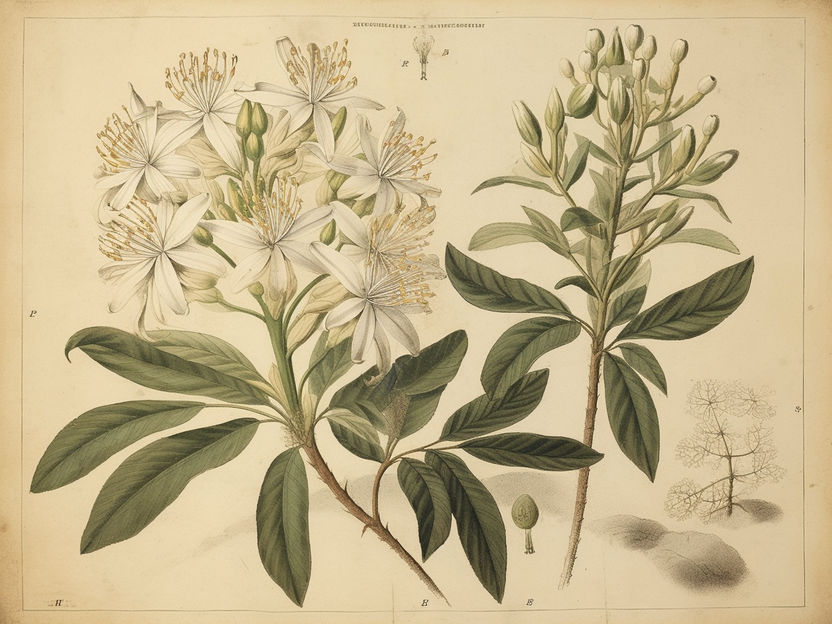Traditional medicine plant could combat drug-resistant malaria
Much of what is now considered modern medicine originated as folk remedies or traditional, Indigenous practices. These customs are still alive today, and they could help address a variety of conditions. Now reporting in ACS Omega, a team of researchers have identified compounds in the leaves of a particular medicinal Labrador tea plant used throughout the First Nations of Nunavik, Canada, and demonstrated that one of them has activity against the parasite responsible for malaria.

Symbolic image
Computer-generated image
“Labrador tea” refers to multiple, closely related plants — all members of the genus Rhododendron. These are small, evergreen shrubs with fuzzy leaves that, as their name suggests, are steeped to make herbal teas commonly used by the Inuit and Indigenous nations in the U.S. and Canada. Reportedly, drinks made from the leaves or roots can aid in treating colds or the flu, headaches or stomach aches, nasal congestion and many other ailments. Past studies have shown that essential oils extracted from the plants have antimicrobial properties, which could help fight antibiotic-resistant microbes. Dwarf Labrador tea, or Rhododendron subarcticum, produces a particularly aromatic brew and grows in the harsher conditions of the subarctic, found from Alaska to Siberia just south of the Arctic Circle. Despite its common use as a traditional medicine, its chemical composition and potential antimicrobial applications remain relatively unstudied. So, Normand Voyer and colleagues wanted to characterize the makeup of R. subarcticum for the first time and test its antiparasitic activity.
The team gathered R. subarcticum leaves from Nunavik, a region in northern Quebec. The researchers extracted the essential oil from the leaves and analyzed it with gas chromatography, mass spectrometry and flame ionization detection, to identify 53 compounds. It turns out that 64.7% of the oil was comprised of ascaridole, followed by p-cymene at 21.1%. This combination of compounds has not previously been reported in closely related North American Labrador tea varieties, though it has been found in subspecies originating in Europe and Asia.
To see whether this essential oil had antimalarial properties, the team exposed two strains of Plasmodium falciparum, a malaria-causing parasite, to the oil or to just ascaridole. In the experiment, one of the strains was resistant to known antimalaria drugs. The data showed that ascaridole was the primarily component that acted against both strains of the parasite, which is consistent with other, antiparasitic traditional medicines also rich in the compound. The researchers say that this work bolsters the importance of investigating and protecting plants used in traditional medicines, especially those from harsher climates impacted by climate change.
Original publication
Original publication
Jean-Christophe Séguin, Dominic Gagnon, Sarah Bélanger, Dave Richard, Xavier Fernandez, Stéphane Boudreau, and Normand Voyer; Chemical Composition and Antiplasmodial Activity of the Essential Oil of Rhododendron subarcticum Leaves from Nunavik, Québec, Canada; ACS Omega; 2023
Topics
Organizations
Other news from the department science

Get the life science industry in your inbox
By submitting this form you agree that LUMITOS AG will send you the newsletter(s) selected above by email. Your data will not be passed on to third parties. Your data will be stored and processed in accordance with our data protection regulations. LUMITOS may contact you by email for the purpose of advertising or market and opinion surveys. You can revoke your consent at any time without giving reasons to LUMITOS AG, Ernst-Augustin-Str. 2, 12489 Berlin, Germany or by e-mail at revoke@lumitos.com with effect for the future. In addition, each email contains a link to unsubscribe from the corresponding newsletter.
Most read news
More news from our other portals
See the theme worlds for related content
Topic world Gas chromatography
Gas chromatography is an essential method in analytical chemistry for the separation and analysis of volatile compounds. Due to its high resolution and sensitivity, it has become firmly established in areas such as environmental analysis, food chemistry or forensic science. GC provides precise and reliable results and enables deep insights into the chemical composition of samples.

Topic world Gas chromatography
Gas chromatography is an essential method in analytical chemistry for the separation and analysis of volatile compounds. Due to its high resolution and sensitivity, it has become firmly established in areas such as environmental analysis, food chemistry or forensic science. GC provides precise and reliable results and enables deep insights into the chemical composition of samples.
Topic World Mass Spectrometry
Mass spectrometry enables us to detect and identify molecules and reveal their structure. Whether in chemistry, biochemistry or forensics - mass spectrometry opens up unexpected insights into the composition of our world. Immerse yourself in the fascinating world of mass spectrometry!

Topic World Mass Spectrometry
Mass spectrometry enables us to detect and identify molecules and reveal their structure. Whether in chemistry, biochemistry or forensics - mass spectrometry opens up unexpected insights into the composition of our world. Immerse yourself in the fascinating world of mass spectrometry!



















































